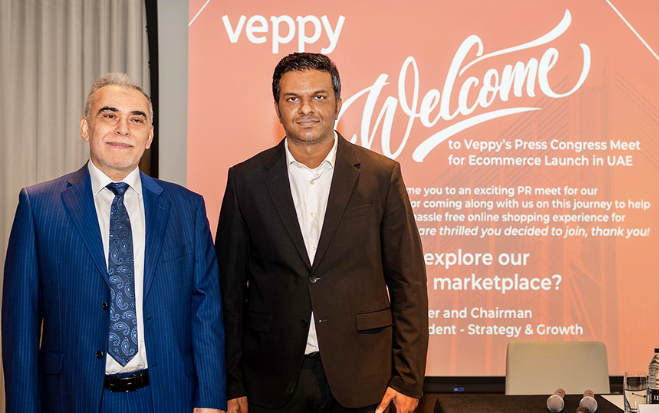Kumar Shyam
A new e-commerce marketplace startup is promising to fill “the gap” it sees with giants such as Amazon, Noon and others as it prepares for a launch on August 27.
Veppy.com will be a Q-commerce (Q for quick), the faster version of an e-commerce operation, and promises delivery for certain categories of products in less than three hours.
According to the top brass, founder-chairman Moustafa Banbouk and vice president Praveen Kumar, a large part of SMEs are “not yet on the digital platforms” for sales. And small and medium enterprises constitute more than 80 percent of UAE’s economy.
With Veppy, which takes its name from the company motto “very happy”, sellers can look forward to connecting with buyers over 14 categories to start with. Most of the focus will be on products, which are gift ideas mostly.
“Imagine we have an occasion we forgot and need to buy a gift – flowers, cakes, any tech product – urgently and we are at work … with Veppy we can address that,” Mr Banbouk told Headline at a hotel in Dubai.
His deputy Mr Kumar, who has built a career out of focusing on digital transformation for his clients, explained that the company will not be investing in warehouses and will directly connect the buyer with the seller to ensure the quickness of product delivery.
“There will be no fees for registering for the seller, and we will offer a consultative process during the onboarding of the seller. However, there will be a fee with each transaction involved for the seller,” Mr Kumar said.
___________________
ALSO READ: It is Prime time for Amazon faithful among UAE shoppers!
___________________
Mr Banbouk, a property developer in a family business in Lebanon, is excited about succeeding with his q-commerce model in UAE, the land of opportunities and where digital growth is the best in the region.
Q-Commerce – sometimes used interchangeably with ‘on-demand delivery’ and ‘e-grocery’ – is e-commerce in a new, faster form. It combines the merits of traditional e-commerce with innovations in last-mile delivery.
It is one of the fastest-growing businesses in the world. Driven by the changing consumer behavior dominated by last-minute shopping trends, the Q-Commerce market in the Middle East and North Africa (MENA) region is expected to grow from US$9 billion in 2020 to US$20 billion by 2024, according to Statista.com, a global market intelligence provider. Globally, the Q-Commerce market for food and grocery delivery is expected to grow to $72 billion by 2025, according to a report by Forbes magazine.
An analysis by the Dubai Chamber of Commerce and Industry revealed during the Gulfood Breakfast Briefing event at Gulfood 2021 that as per Euromonitor’s data, online sales within the UAE’s food and beverage market surged 255% year-over-year in 2020 to reach $412 million.
The analysis predicted the value of online food and beverage sales in the country to reach $619 million by 2025 and record a compound annual growth (CAGR) of 8.5% over the 2020-2025 period.
The latest estimates from Visa Middle East have forecasted the total MENA E-Commerce market size, including all categories, to be worth US$48.6 billion in 2022.
